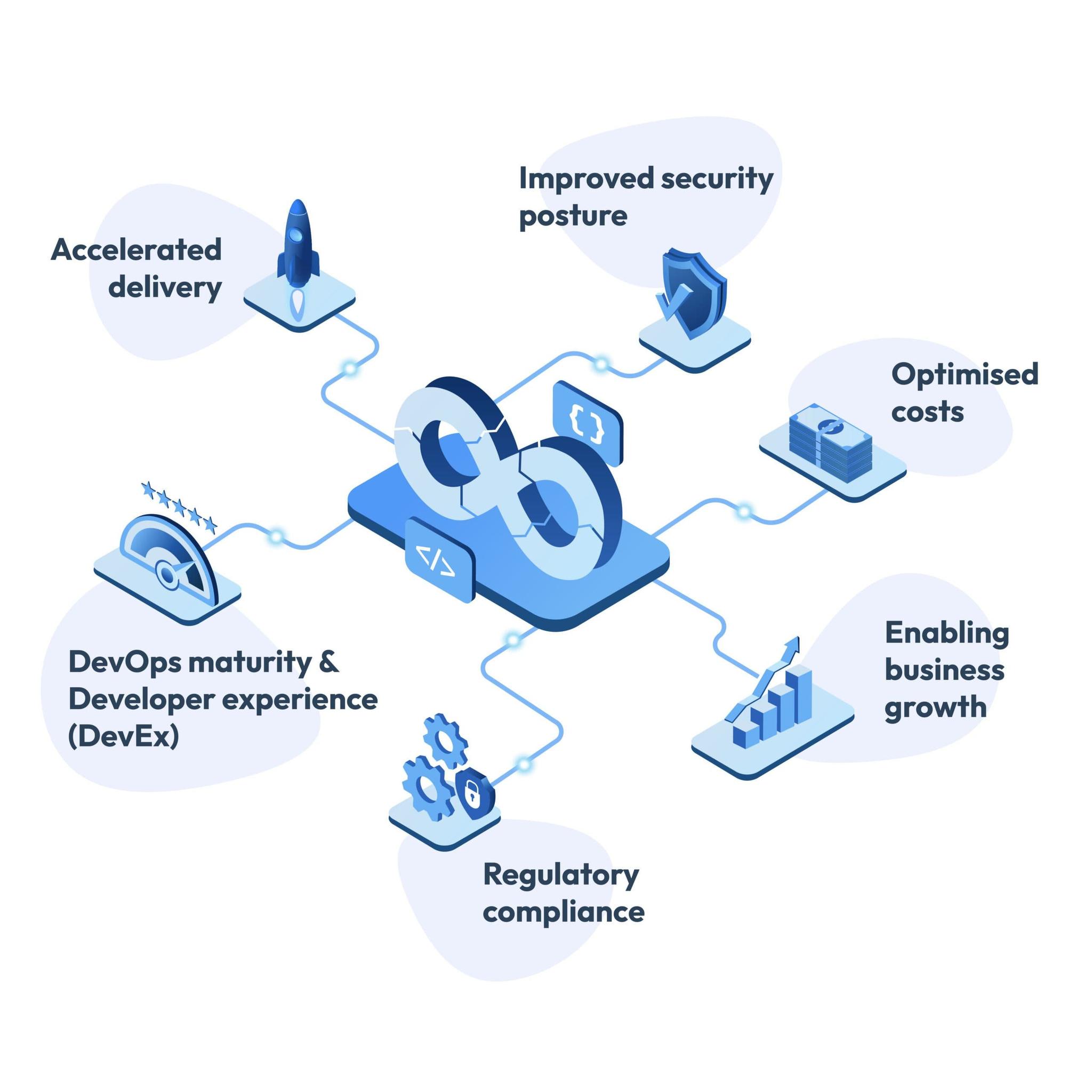A Deeper Look At The Role of Developer Self-Service
In the modern software development landscape, speed and agility are key. However, this acceleration should not come at the expense of security and compliance, especially in regulated environments. Developer Self-Service and Developer Experience (DevEx) have emerged as models to address this balance, ensuring that developers can swiftly promote their applications through lower and upper environments, all the way to production, while adhering to organisational compliance and security policies.

The Importance of Developer Self-Service
Developer Self-Service is all about empowering developers. Organisations can accelerate software delivery without compromising on quality or security by providing them with the tools, processes, and autonomy they need. This approach boosts developer productivity and fosters innovation, as developers can experiment, iterate, and deploy confidently.
What is Developer Self-Service?
Developer Self-Service refers to providing tools, platforms, and environments that allow developers to access resources independently, deploy infrastructure as code (IaC), deploy application code and manage applications without constant intervention from other teams.
Examples of Developer Self-Service
- Self-Service Portals: Platforms where developers can provision infrastructure, databases, or other resources on-demand, without waiting for manual approvals or processes
- Automated CI/CD Pipelines: A system designed for developers, enabling them to generate a structured CI/CD pipeline automatically. This pipeline can manage infrastructure provisioning and building, testing, and deploying application code while ensuring adherence to the organisation’s coding, testing standards, and security policies.
Why Developer Self-Service Matters
- Speed and Agility: Developers are empowered to operate at a faster pace. They can swiftly build infrastructure that can be decommissioned automatically after use. This allows them to continuously refine their code and deploy updates without the hindrance of external procedures, like the cumbersome ticketing system or waiting on other teams for execution. Decommissioning infrastructure after use ensures the organisation does not incur unexpected costs.
- Innovation: With the freedom to experiment and access resources on-demand, developers can innovate more freely, knowing they will comply with the organisation’s policies without worrying about them.
- Reduced Overhead: Other teams spend less time on routine requests, such as creating and running CI / CD pipelines, focusing instead on high-value tasks.
Advantages of Developer Self-Service

- Accelerated Delivery: The benefit of Developer Self-Service lies in its ability to expedite software delivery. By providing developers with tools and platforms that allow them to access resources, deploy code, and manage applications independently, the time from development to deployment is reduced. With its deep-rooted engineering ethos, Adroit understands this need for speed and offers solutions that streamline these processes, ensuring rapid delivery while adhering to organisational standards and security policies.
- Improved Security Posture: Security is essential. Adroit’s insights on security in CI/CD pipelines emphasise integrating security measures right from the development phase. By proactively detecting and addressing vulnerabilities, organisations can safeguard their digital assets and bolster their security posture. This article can be found here: Security In-CI CD pipelines
- Optimised Costs: Developer Self-Service is not just about speed; it’s also about efficiency. Organisations significantly reduce overheads by reducing the need for constant intervention from other teams. Infrastructure created for development and testing purposes can be decommissioned automatically, further reducing costs that would otherwise be incurred by leaving it running.
- Regulatory Compliance: In today’s regulated digital landscape, compliance is non-negotiable. Adroit’s deep understanding of sectors like finance and government ensures that their solutions are tailored to meet specific regulatory requirements. By integrating Developer Self-Service tools with compliance protocols, organisations can ensure that they remain compliant while benefiting from accelerated software delivery.
- Enabling Business Growth: Every business aspires to grow and expand. Through Developer Self-Service, companies can accelerate this growth. Organisations can be more agile, innovative, and ready to seize new market opportunities by empowering developers with the tools and autonomy to respond to business needs swiftly. This approach streamlines operations and positions businesses to adapt and thrive in a constantly evolving marketplace.
- DevOps Maturity & Developer Experience (DevEX): The symbiotic relationship between DevOps maturity and DevEx is undeniable. As businesses mature in their DevOps journey, the emphasis on DevEx becomes even more pronounced. With its engineer-led approach, Adroit ensures that tools, platforms, and processes are efficient and developer-centric. This dual focus ensures that while operational excellence is achieved, developers also have a positive, productive experience, driving further innovation and excellence.